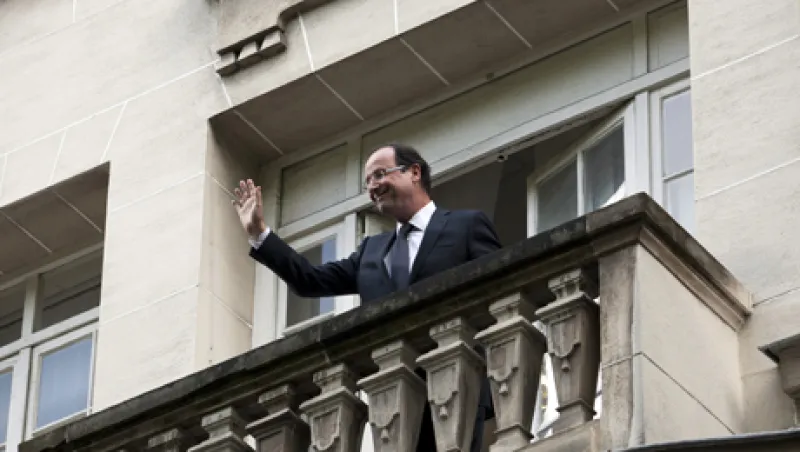Socialist François Hollande’s victory in the French presidential election on Sunday will have little immediate impact on the euro zone crisis but is likely to lead to at least a softening of the austerity policies that currently prevail within the single-currency area, economists say.
Further signs of a shift in policy came this week from Germany’s finance minister and central bank, which signaled that they would be willing to see higher wage growth and inflation in Germany to help resolve the crisis. The changing positions of France and Germany reflect new political realities in the European Union, where severe recessions in the periphery of the euro area and sharp increases in unemployment have triggered a backlash against the austerity policies that the bloc has embraced. In addition to the election of a socialist to head France, the region has seen Greek voters reject the two main parties that supported the country’s debt and economic reform package with the EU and International Monetary Fund and the collapse of the Dutch coalition government because of disagreements over budget cuts.
German Chancellor Angela Merkel has been championing the euro zone policy mix of tough budget cuts and structural reform, and she received strong support in her efforts from Nicolas Sarkozy, France’s center-right president.
In contrast, Hollande defeated Sarkozy by campaigning for changes to the EU fiscal compact, an agreement struck in March that commits euro zone countries to reduce their deficits and debts. Hollande called for the pact to be amended to include a “growth” component. Although the president-elect has been vague about what such a component should consist of, it is widely expected to include smaller budget cuts to support household spending, if not new government spending.
“This is a crisis of external funding much more than a fiscal one,” Evariste Lefeuvre, managing director and chief economist for the Americas at French investment bank Natixis, told a meeting on country risk held in New York City on Thursday by Coface, a political-risk research subsidiary of Natixis.
Lefeuvre said Hollande’s victory reflected the public’s growing “fear of austerity,” and that this fear is depressing household spending, which he described as “collapsing all over” the euro zone.
Merkel has said she would oppose any change to the fiscal compact, but other policymakers hinted at a softening of Germany’s stance. The Bundesbank on Wednesday announced that it could countenance Germany having a higher inflation rate than its EU partners, while Finance Minister Wolfgang Schäuble told the European Parliament that day that he would support higher wage growth in Germany. Such moves by Germany could help ease the deflationary pressures on countries like Greece, Portugal and Ireland.
Lefeuvre told Institutional Investor that he thought Hollande’s election would have “not that much impact” on the outcome of the sovereign debt crisis but that the new French president’s influence would indeed be felt on “the evolution of the institutions of Europe.” He cited a need for Eurobonds and more aggressive use of the European Financial Stability Facility.
To support a move away from austerity, some economists cite a recent proposal for defusing the crisis by Yanis Varoufakis, an economics professor at the University of Athens, and Stuart Holland, a former U.K. parliamentarian from the Labour party. Their three-part plan calls for the issuance of eurobonds to collectively finance governments’ excessive debts, an increase in European Investment Bank lending to support growth — a measure that France’s Hollande has endorsed — and using the EFSF to recapitalize Europe’s overleveraged banks.
Supporting the view that the incoming French president will push for such changes, some observers note the rising influence on Hollande of Michel Rocard, who served as prime minister in President François Mitterand’s socialist government from 1988 to 1991. “Rocard is well-briefed on [the Varoufakis proposal], and his apparent emergence as a close adviser to Hollande is interesting from that point of view,” James Galbraith, an economics professor at the University of Texas and critic of austerity, told Institutional Investor in an email on Thursday.
The Bundesbank has long been one of the most vigorous opponents of such ideas and has considerable sway over the European Central Bank. In light of that, Lefeuvre told II that he found the German bank’s change of heart on domestic inflation “very surprising.”
Still, Lefeuvre doesn’t expect a total about-face by the EU. He told the Coface meeting to expect “maybe not more government spending, but less cuts.” The EU fiscal compact is subject to a public referendum in Ireland on May 31 and is facing rising opposition there. There have also been calls for its amendment by leading members of the Italian parliament.






